![]()
![]()
![]()
Use LEFT and RIGHT arrow keys to navigate between flashcards;
Use UP and DOWN arrow keys to flip the card;
H to show hint;
A reads text to speech;
81 Cards in this Set
- Front
- Back
|
Atonement |
Reconciling with God. |
|
|
Anti-realism |
An anti-realism claims that particular aspects of the world have no real existence beyond human minds and language. |
|
|
Atheism/ atheist |
Not a Theist- Do not believe in a God. |
|
|
Benevolence |
The desire and disposition to do good to do good to others.
>Christian philosophers maintain that God has the property of complete benevolence (omni-benevolence) |
|
|
Classical Theism |
A term identified with the philosophical analysis of God from medieval times- The traditional views and ideas of Christianity. -Put defines God as real, timeless, eternal, infinite, omnipotent, omniscient and perfectly good. |
|
|
Deduction |
A detective argument is one where the truth of the conclusion (a logically necessary one) is guaranteed by the proof of the premises. (E.g, all men are mortal> Socrates is a man> Therefore Socrates is mortal) |
|
|
Determinism |
The belief that all events in the universe are a necessary consequences of physical laws, and these laws apply to human actions as well.
A determinist might claim that humans are like complex pieces of biological machinery with no real freedom of will. |
|
|
Epistemic distance |
[A term used by John Hicks]
A distance from knowledge of God.
-Used to ensure that human actions are completely free and not in anyway influenced by God. (Episteme is Greek and means 'knowledge') |
|
|
Eschatological verification |
(From the Greek 'eschaton' meaning the 'end of time' or 'the afterlife') Associated with the theory from John Hick that religious beliefs will be verified in the next life and in the concept of Judgement after death in Augustine's theodicy. |
|
|
Evil |
Extreme kinds of moral wrong-doing.
Philosophers usually distinguish between moral evil, which is the suffering caused by humans, and natural evil, which is the suffering brought about by natural events such as earthquake.
-The existence of evil in the universe presents a challenge to believers known as the problem of evil. |
|
|
Evidential problem of Evil |
The view that evil is strong evidence against the existence of God. |
|
|
The Fall |
The ideological theory about the events surrounding Adam and Eve in Genesis 2-3. It refers to man's fall from grace following Adam's disobedience. |
|
|
Freewill |
The idea of freewill is that the self controls aspects of its own life: In other words, the ability to make one's own decisions and to choose freely between different possible actions. -Many religious philosophers believe that God granted humans freewill. -Freewill can be contrasted to Determinism (belief that all events in the universe are necessary and claim that we have no real freedom of our own) |
|
|
Immutable |
Something that can never change. -God is said to be immutable, and this is bound up with the idea that God is simple (he is one thing, and his attributes such as benevolence and omnipotence cannot be separated from one another and these characteristics will never change) |
|
|
The Inconsistent Triad: |
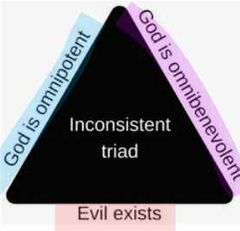
Means that a good and all-knowing God cannot exist at the same time as evil, another way of thinking about the logical problem of evil.
-It is not logically possible for all 3 to exist at the same time as they contradict with each other. |
|
|
Explained diagram of the inconstant Triad: |
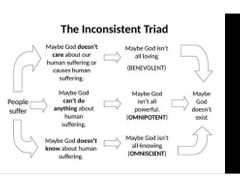
[Note- omniscient is often put with omnipotent] |
|
|
Induction/ Inductive |
An inductive argument is one where the truth of the conclusion is not fully granted by the truth of the premises. Example: Moving from particular examples (every swan I have seen is white) to a generalisation (all swan's are white), a likely or probable conclusion (as in a posteriori arguments) |
|
|
Moral Evil |
Results from human action which cause suffering or harm. (E.g, The Holocaust) |
|
|
Myth |
An event that need not be understood to have happened as described (literally but symbolically), but which contains a deeper truth or raises ultimate questions about human existence. (e.g why is there suffering in the world) |
|
|
Natural Evil |
Results from events which cause suffering but over which human beings have little control (e.g, earthquakes and disease). |
|
|
Natural theology |
Attempting to know God by reason alone. The term is associated with proofs for God's existence. |
|
|
Omnibelvolence |
All-loving. One of the man attributes of God. |
|
|
Omnipotence/ Omnipotent |
All-powerful. One of the main attributes of God. |
|
|
Omnipresence/ omnipresent |
Everywhere at once. One of the main attributes of God. |
|
|
Omniscience/ omniscient |
All-knowing. One of the main attributes of God. |
|
|
(The doctrine of) Original sin |
A reference to the first sin of Adam and Eve in the garden of Eden and its effects, according to traditonal belief.
Some believe that everyone is born with original sin within us after being seminally present in the loins of Adam. |
|
|
Perfection |
Another traditonal characteristic or quality of God: It means that God is lacking nothing and can be no different or better. |
|
|
Privatio boni (Privation of Good) |
An absence or lack of good. A malfunctioning of something that in itself is good. |
|
|
Process Theodicy |
Essentially argues that God is not omnipotent, and that he is inside the world, doing the best to combat the forces of chaos. He shouldn't be condemned for the existence of evil, rather he should be praised for doing his best to stop it. (Similar to Plato's Demiurge) |
|
|
Protest Theodicy |
The Theodicy of protest puts God on trial. God is truly omnipotent, and really has the power to change the course of history if he wants to. However, nothing can justify ball the evil and suffering we see going on in the world, and the responsibility for it all lies squarely with God as he has the ability to stop it. -Can be considered an anti-theodicy as it questions why God allows suffering. |
|
|
Purgatory |
Is a state of existence post death in which people are purified by punishment after death before assenting to Heaven. |
|
|
Qualification |
Redefining the nature of God in order to avoid the implications of the problem of evil. |
|
|
Recapitulation |
Is often applied to the ideas of Irenaeus concerning the problem of evil. Irenaeus' Theodicy is considered with bringing people back into relationship with God, hence it is called a theory of recapitulation. |
|
|
Soul-deciding |
People's response to evil decides their destiny (e.g, Augustine's Theodicy) |
|
|
Soul-making |
The presence of evil helps people to grow and develop (e.g Irenaeus and also supported by the modern philosopher John Hicks) |
|
|
Theism/ Theist/ Theistic |
Belief in God. This is in contrast to atheism (the belief that there is more than one God) and agnosticism (refusing to commit to either atheism or Theism) |
|
|
Theodicy |
A justification of the righteousness of God, given the existence of evil. In other words it is an attempt by philosophers to reconcile the goodness and omnipotence of God with the existence of evil. Augustine and Irenaeus are two key scholars. The freewill defence is one of the most popular theodicies. |
|
|
The 2 types of evil: |
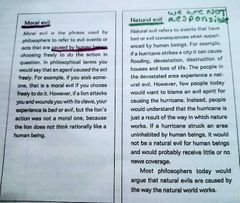
|
|
|
Summary- 1) The problem |

|
|
|
Summary- 2) Why the existence of evil challenges belief in God |

|
|
|
Summary- 3) Theodicy |

|
|
|
Summary- 4) Types of Evil |
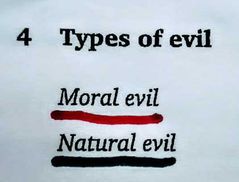
|
|
|
Summary- 5) Possible solutions |

|
|
|
Summary- 6) The Theodicy of Augustine |
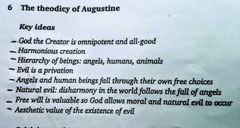
|
|
|
Summary- 6b) Criticisms of Augustine's Theodicy |
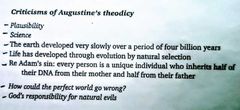
|
|
|
Summary- 7) Irenaean Theodicy |
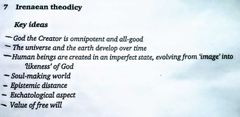
|
|
|
Summary- 8) Criticisms of Hick's Theodicy |
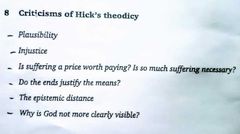
|
|
|
Why is Evil a Logical problem for the religious believer? |

|
|
|
The Freewill Defence |

|
|
|
Soren Kierkegaard's Analogy of 'The King and the Peasant Girl' |

[Supports the freewill defence] |
|
|
Swinburne's support for freewill |
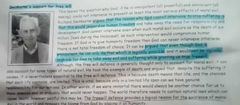
|
|
|
Mackie's view on freewill and Evil |

|
|
|
Hick's criticism on Makie's view for Evil and freewill |
Hick argues that if God had designed humans to always choose good like Major suggests they would not truly be free. Their choices would end up being restricted. |
|
|
Peter Vardy's criticism of the Freewill Defence |
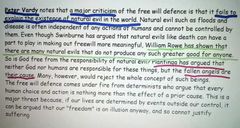
|
|
|
What is the Freewill Defence? |
The idea that Evil is the result of humans freewill rather than God's will. |
|
|
Epicurus view on Evil |
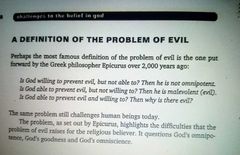
|
|
|
THE THEODICY OF AUGUSTINE: KEY IDEAS |
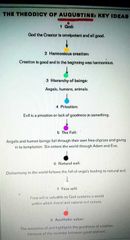
|
|
|
THE IRENAEAN THEODICY: KEY IDEAS |
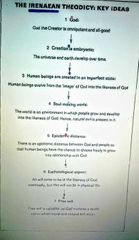
|
|
|
Explain the 'Aesthetic Principle' in Augustine's Theodicy |
When we look at creation (the universe) as a whole, the contrast between good & evil, the beauty of goodness is heightened and compensates the bad. |
|
|
Explain what is meant by 'seminally present' in Adam and how this is linked to the problem of evil: |

|
|
|
Augustine's Cosmology (hierarchy of beings) |
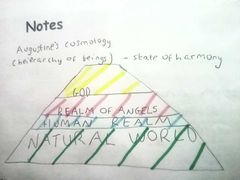
|
|
|
Augustine's Theodicy (Soul-deciding) |
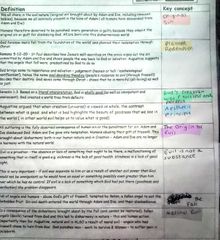
|
|
|
The challenges from science to Augustine's Theodicy |

|
|
|
How can a perfect world go wrong |

Augustine believed that God created the world perfect, here's how it can go wrong; |
|
|
How does John Hick re-work Irenaeus' Theodicy (supporter of Irenaeus): |
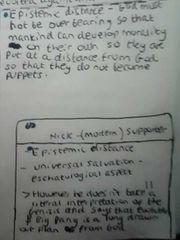
-Hick also rejects Irenaeus' belief in the Fall |
|
|
Key concepts from Irenaeus- |
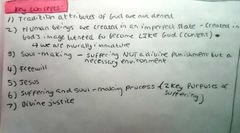
|
|
|
Hick's two stages in the development of human beings: |
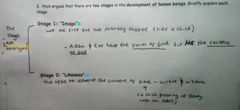
|
|
|
What is the eschatological aspect of Hick's Theodicy? |
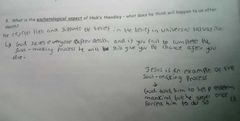
|
|
|
How does Hick explain natural evil? |

|
|
|
Key concepts of Irenaeus' Theodicy- |
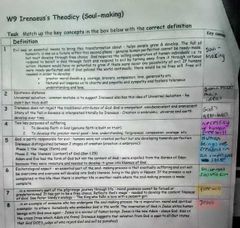
|
|
|
Criticisms of John Hick |
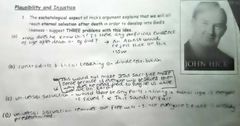
|
|
|
More criticisms of John Hick |
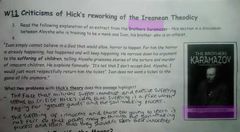
[Brothers Karamazov- written by Dostroyevsky] |
|
|
AUGUSTINE & IRENAEUS- Similarities & Differences: |
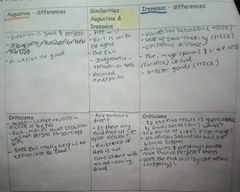
|
|
|
What is the protest Theodicy? |

|
|
|
John Roth- Supporter of the Protest Theodicy: |

|
|
|
Why is protest Theodicy similar to the criticism of God and evil raised by Dostroyevsky in his novel 'The Brothers Karamazov'? |

|
|
|
Irving Greenberg: |

|
|
|
Evaluating John Hick |
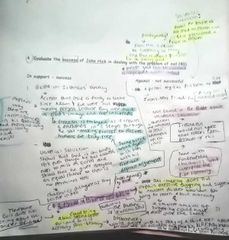
|
|
|
*ESSAY GRADE A EXAMPLE* |
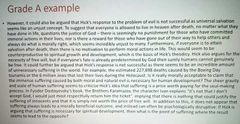
|
|
|
Improving an essay example- |
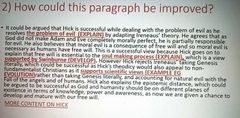
|
|
|
Deism |
It's followers believe that God exists, but they reject all religions.
According to Deist Philosophy, God created the Universe and all its creatures but does not intervene in what they have created, and does not lay out rules or principles that must be followed. (It is often categorised with Agnostics) |

